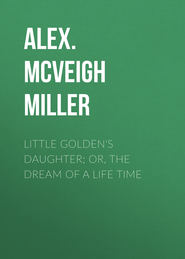По всем вопросам обращайтесь на: info@litportal.ru
(©) 2003-2024.
✖
Laurel Vane; or, The Girls' Conspiracy
Настройки чтения
Размер шрифта
Высота строк
Поля
"Oh, sir, surely you know she was very unhappy," she faltered.
"About her lover?" asked Mrs. Le Roy.
"Ye—es, madam," faltered the maid, weakly.
St. Leon had crossed to the door. He came back and laid his strong protecting hand gently on his mother's shoulder, and looked down into her troubled face.
"Mother, do not be frightened," he said. "I will find Beatrix for you. Ring for lights, and let Clarice stay here with you. I will search for the child."
The words kindled a gleam of hope in her breast. She did not see how deathly white his own face had grown.
He left her, and went out into the grounds on his self-appointed mission of finding the missing girl. A new moon had risen, piercing the twilight darkness with shafts of mellow light. In its mystic rays the white graveled walks and groups of marble statuary glimmered ghostly pale and wan. Clarice's apprehensive words rang in his ears:
"I am afraid she has thrown herself into the water."
"Not that—oh, not that," he said to himself.
He left the more open grounds and went out into the thick shrubberies. The dew was falling heavily, and the fragrance of flowers was borne on the air. The almost oppressive sweetness of the tube-rose, then at the height of its blooming, stole gently on his senses, but ever afterward it was connected in his mind with a sense of loss and pain.
"Beatrix, Beatrix!" he called ever and anon, in his eager search, but no sweet voice replied, no slender, white-clad form bounded out from among the dark green trees. He felt a strange sense of dreariness in his search for Cyril Wentworth's missing love.
"She was very unhappy—I had begun to forget that," he said to himself. "She had changed so much I thought she was beginning to forget that episode with Cyril Wentworth. Was her apparent indifference only a clever mask? Has she fled with him?"
He crushed something like a bitter execration between his lips at the thought, and went on crashing madly through the shrubbery, and so came out into the quiet dell where Beatrix had hidden that evening in her frantic dread of Ross Powell.
He followed the course of the little singing stream that tried to tell him in its musical murmur, "She is here, she is here," but he was deaf to Nature's voice. His heart's cry drowned it.
"Why am I seeking her here?" he muttered, bitterly. "My mother was right. She has had too much liberty. Cyril Wentworth has stolen her away."
Nay, a sudden lance-like gleam of the silvery moonlight broke through the interlacing boughs of the trees and touched with a pencil of light a little white heap of something huddled under the bowering trees. He went nearer, knelt down, and a cry of joy broke from his stern, mustached lips.
CHAPTER XIV
She had not thrown herself into the river, she had not fled with her lover. He had wronged her in his thoughts. She was here. Like a weary child she had flung herself down with her pale cheek pillowed on one round, white arm, and was sleeping deeply, exhaustedly, with the flowers all fallen from her apron and strewed in odorous confusion about her.
He bent his dark head low over the golden one—perhaps to listen if she slept—some murmured words fell from his lips. They sounded like "My darling," but it must have been the wind sighing in the leaves above them, or, perchance, the musical ripple of the little streamlet. St. Leon Le Roy was too proud and cold for such a weakness.
But he did not awake her at once. He bent over her softly, and the shapely hand with its costly diamond flashing in the moonlight, moved gently over the waving ripples of golden hair in mute caress as though she had been a child.
How still and pale she lay. The white radiance of the moonlight made her look so cold and white it thrilled him with a strange terror.
"What if it were death?" he muttered, darkly, with a shiver. "Death? Well," with a sudden, baleful fierceness, "what then? Better death than surrender her to Cyril Wentworth!"
And a red-hot flame of jealousy tore his heart asunder like the keen blade of a dagger.
He gazed for a moment in almost sullen satisfaction on the white, sleeping face, then suddenly his mood changed. Something like fear and dread came into his eyes.
"Am I mad?" he asked himself, with a bitter self-reproach in his voice, and he shook her gently, while almost unconsciously he called her name aloud:
"Beatrix—darling!"
With a start she opened her eyes. She saw him bending over her with an inscrutable expression upon his face. It was frowning, fierce, almost bitterly angry. Yet all the summer night around her, her languid pulses, and her beating heart, seemed to thrill and echo to one sweet, fierce whisper. "Darling!" Had she dreamed it? Was it but the figment of her slumbering brain?
As she struggled up she put out her hands to shut out the sight of his face that seemed to frown darkly upon her. A cry broke from her lips, full of fear and deprecation.
"Do not be angry. Do not scold me!" she wailed. "I am very sorry—I—I will go away!"
"She is not half awake—she is dreaming," he said to himself, and he touched her again, gently. "Wake up, Miss Gordon," he said; "you are dreaming. I am not going to scold you, although you have given us all a terrible scare falling asleep in the grounds at this hour of the evening."
The somber, black eyes stared at him affrightedly. She did not comprehend him yet.
"Oh, Mr. Le Roy, has he told you all?" she cried, clasping her small hands tightly in the agony of her excitement. "Do you hate me, despise me? Must I go away, all alone," with a shudder, "into the dark, dark night?"
"Still dreaming," said St. Leon Le Roy to himself, and with a sudden impulse of pity he bent down, put his arms about the small white figure, and lifted her up to her feet. Then holding her gently in the clasp of one arm, he said, like one soothing a frightened child:
"You have been asleep, Miss Gordon, and your dreams were wild. Rouse yourself now, and come into the house with me. My mother is greatly frightened at your absence!"
"Frightened," she repeated, a little vaguely, and nestling unconsciously nearer to the warm, strong arm that held her.
"Yes, you have been missing several hours, and we have all had a great fright about you. Clarice searched for you several hours, but I had the happiness of finding you," he said, gently.
"And—nothing has happened? You are not angry?" she asked, the mists beginning to clear from her brain.
"Nothing has happened, except that a gentleman came to see you and went away disappointed. I am not angry, yet I ought to be, seeing what a fright you gave me. Only think of me, Miss Gordon, rushing about the garden with my mind full of 'dire imaginings,' and finding you asleep on the grass like a tired baby. What a descent from the sublime to the ridiculous!"
She began to comprehend all and drew herself, with a blush, from the arm that still held her gently.
"Pardon me. You were half asleep and I held you to keep you from falling," he said, with cool dignity. "Shall we return to the house now? My mother is in great suspense."
"I am very sorry," she began, penitently, as she moved on quietly by his side. "I did not mean to frighten any one. You—you were very kind to come and look for me."
In her heart she was secretly singing pæans of gladness. She was not discovered yet. Her clever move that evening had thrown her enemy off his guard. Trying to keep the tremor out of her voice, she asked with apparent carelessness:
"Who was my visitor, Mr. Le Roy?"
"Whom do you imagine?" he responded.
"Was—was it Mr. Wentworth?" she inquired, with artless innocence and something in her voice that he interpreted as hope and longing.
"Do you suppose that Mr. Wentworth would be admitted inside the doors of Eden?" he inquired, with grim anger.
"Why not?" said she, timidly.
"You must know that we have our instructions from your mother," he answered, stiffly.
Laurel decided that it would be in keeping with her character of Beatrix Gordon to argue the point a little with Mr. Le Roy.
"Do you not think that mamma is a little harsh, Mr. Le Roy?" she ventured, timidly. "Mr. Wentworth is good and noble and handsome. His only fault is that he is poor."











